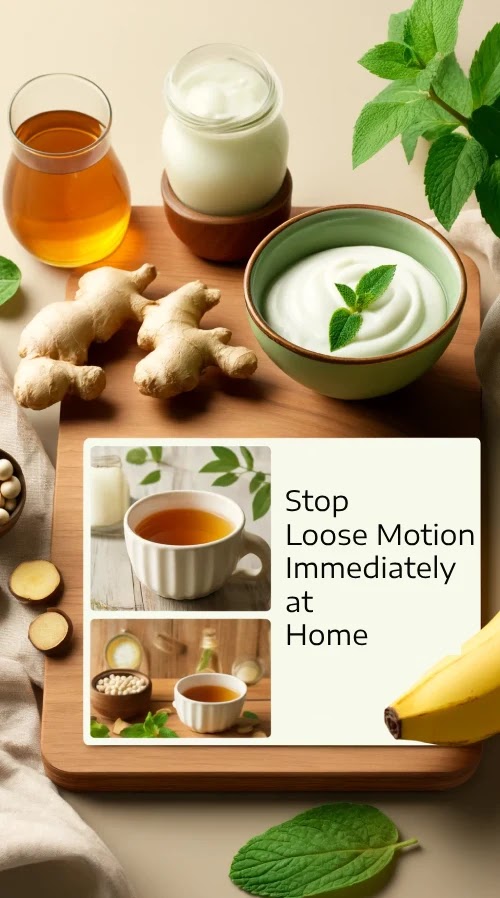Introduction
Loose motion, or diarrhoea, is characterized by frequent, watery stools and can arise from various factors including infections, dietary issues, or stress. While often manageable at home, effective treatment involves a combination of dietary adjustments, hydration, and natural remedies. This article provides a detailed guide to address and stop loose motion immediately at home. Learn natural tips for fast relief from digestive issues. (Read This: Instant Home Remedy for Bloated Stomach and Gas: Quick Remedy)
Understanding Loose Motion
Loose motion is not a disease but a symptom of an underlying condition. Causes can range from infections to dietary sensitivities and stress. Understanding the cause can help in selecting the appropriate treatment. Common causes include:
- Infections: Caused by viruses (like norovirus), bacteria (such as E. coli), or parasites (like Giardia).
- Food Intolerance: Reaction to certain foods, such as lactose or gluten.
- Medication Side Effects: Particularly antibiotics that disrupt gut flora.
- Digestive Disorders: Conditions like Irritable Bowel Syndrome (IBS) or Inflammatory Bowel Disease (IBD).
- Stress and Anxiety: Emotional stress can impact the digestive system.
Immediate Home Remedies
 |
| How to Stop Loose Motion Immediately at Home for Adults |
Hydration
Maintaining hydration is critical when dealing with loose motion. Diarrhea causes the loss of fluids and electrolytes, which can lead to dehydration.
Oral Rehydration Solutions (ORS): These are specifically designed to replenish lost fluids and electrolytes. They should be available at pharmacies according to the package instructions.
Homemade Rehydration Solution: - 1 litre of water - 6 teaspoons of sugar - 1/2 teaspoon of salt Mix these ingredients until dissolved and drink in small sips throughout the day
Dietary Adjustments
Certain foods can help to firm up stools and soothe the digestive tract:
- BRAT Diet: The BRAT diet includes bananas, rice, applesauce, and toast—bland foods that are gentle on the stomach.
BRAT Diet: - Bananas: High in pectin which helps absorb liquid in the intestines. - Rice: A bland carbohydrate that helps bulk up the stool. - Applesauce: Contains pectin and is easy to digest. - Toast: Simple and easily digestible
Clear Broths: Chicken or vegetable broth provides hydration and nutrients without irritating the digestive system.
Herbal Teas: Teas such as chamomile or ginger can reduce inflammation and soothe the digestive tract.
Natural Remedies to Stop Loose Motion
Apple Cider Vinegar
Apple cider vinegar has natural antimicrobial properties that can help manage loose motion.
Usage: - Mix 1-2 tablespoons of apple cider vinegar in a glass of warm water. - Drink 2-3 times a day.Ginger
Ginger is known for its anti-inflammatory and anti-nausea properties.
Usage: - Prepare ginger tea by boiling fresh ginger slices in water. - You can also add honey for additional benefits
Fenugreek Seeds
Fenugreek seeds can help reduce inflammation and improve digestion.
Usage: - Soak a teaspoon of fenugreek seeds in water overnight. - Drink the water and chew the seeds the next morning
Lifestyle Adjustments
Implementing certain lifestyle changes can help manage and prevent loose motion:
Maintain Good Hygiene
- Handwashing: Wash hands thoroughly with soap and water before eating or preparing food.
- Food Safety: Ensure all food is cooked thoroughly and avoid raw or undercooked meats.
Stress Management
Since stress can affect the digestive system:
- Meditation and Yoga: Practice these to manage stress and improve overall digestive health.
- Relaxation Techniques: Deep breathing exercises or progressive muscle relaxation can be beneficial.
When to Seek Medical Attention
While home remedies can be effective for mild cases, certain symptoms require professional medical attention:
- Persistent Symptoms: If diarrhoea lasts more than 48 hours or worsens.
- Severe Dehydration: Indicators include dry mouth, excessive thirst, dark urine, or dizziness.
- Blood in Stools: This could indicate a more serious condition.
- High Fever: Accompanied by diarrhoea, could signify a severe infection.
- Severe Abdominal Pain: Persistent or severe pain should be evaluated by a doctor.
Preventive Measures
To prevent future episodes of loose motion, consider the following:
- Healthy Diet: Incorporate a balanced diet of fibre, fruits, and vegetables.
- Safe Food Handling: Practice proper food hygiene to prevent infections.
- Regular Exercise: Maintain a healthy digestive system through regular physical activity.
- Hydration: Drink plenty of water daily to support optimal digestive function.
Conclusion
Managing loose motion at home involves staying hydrated, adjusting your diet, and using natural remedies effectively. While these measures can provide immediate relief, it is important to seek medical attention if symptoms persist or worsen. By adopting preventive measures and maintaining a healthy lifestyle, you can avoid future episodes and promote overall digestive health.






0 Comments